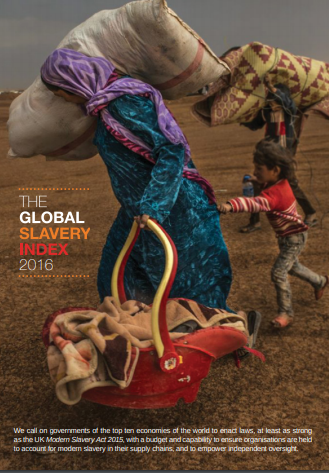EXECUTIVE SUMMARY
The Global Slavery Index (‘the Index’) provides an estimate of the number of people in modern slavery, the factors that make individuals vulnerable to this crime, and an assessment of government action across 167 countries.
The Global Slavery Index is based on state-of-the-art research methodology that has been developed with the assistance of an independent Expert Working Group, comprised of world leading experts. The methodology has also been subjected to independent external review. This estimate is based on data from nationallyrepresentative, random sample surveys conducted in 25 countries.
All surveys were conducted face-to-face in key local languages using a standardised instrument. Collectively, these surveys represent 44 percent of the global population. The results of these surveys have been extrapolated to countries with an equivalent risk profile.
The 2016 estimate is an increase on the estimate provided in the previous edition of the Index. As efforts to measure this hidden crime are still relatively new, we are not asserting that modern slavery has increased in the intervening period. Indeed, results from our surveys reveal some national estimates have increased while others have decreased. We believe that the overall larger number reflects a significant increase in the quality and quantity of research on this issue. While the methodology will continually improve, even at this early stage, survey data have greatly improved the accuracy of our measures.
In 2016, the country with the highest estimated proportion of modern slavery by population is North Korea. Though information on North Korea is difficult to verify, pervasive evidence exists that citizens are subjected to state-sanctioned forced labour, including through forced labour as political prisoners and as workers on overseas contracts.
The 12 country studies included in the Index are a snapshot of the diversity and similarity of modern slavery crimes across the globe, such as the short and long term impact of conflict on slavery (Iraq and Cambodia), the role of the private sector (Thailand and Qatar), and the responsibility of highly developed countries (the UK). New data on under researched countries (such as South Africa and Mexico) are also highlighted. The studies present a range of government responses and confirm that while much work has been done, there is still more to do. Limited implementation and enforcement of laws, and the importance of countering corruption are recurring themes.
The studies confirm that poverty and lack of livelihood opportunities play a major role in increasing vulnerability to modern slavery. They also point to deeper social and structural inequalities that enable exploitation to persist – xenophobia, patriarchy, class, caste, and discriminatory gender norms. Discrimination against minorities traps migrant workers in inhumane working conditions in every continent. The control of women’s sexuality in many societies leads to forced marriage and commercial sexual exploitation. Hierarchical cultures continue to abuse the ‘lowest’ among them, perpetuating intergenerational exploitation.

